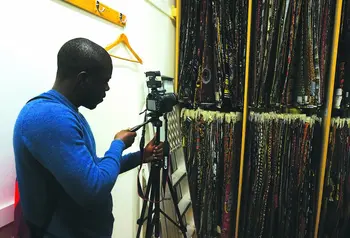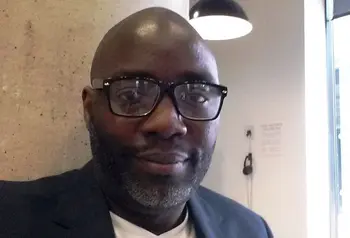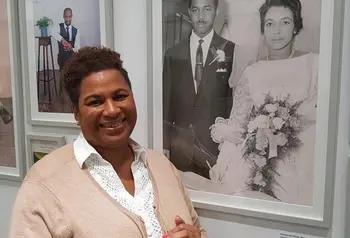Exploring Manchester’s links to the West African textiles industry

Attending funding workshops
We initially took part in a series of workshops devised and delivered by the Heritage Lottery Fund (HLF) and the Manchester BME (Black and Ethnic Minority) Network after coming across a couple of local heritage projects in and around our neighbourhood.
The workshops, which aimed to give a deeper insight into HLF and the application process, were absolutely amazing. There were six sessions delivered at different heritage locations such as the People’s History Museum, Manchester Art Gallery and Quarry Mill.
The sessions gave us the opportunity to build relationships with HLF's development and grants officers, and share project ideas with other participants and organisations.
Supportive approach
The HLF's team in Manchester are open, understanding and encouraging. They are willing to try out new ideas to connect with Manchester’s communities and portray a real genuine flair and passion for groups they work with.
Their supportive approach definitely had an effect on us and the successful outcome of our application.
Motivation and confidence
It was here that we found not only the inspiration, motivation and confidence to develop a heritage project and apply to HLF for a grant, but also where we discovered the seeds of our project idea: Manchester’s Link to West African Textiles through ABC Wax Prints.
“The guidance from the HLF team through the application process, including pointers on how to produce a project plan and project costs, was very useful, especially for a small organisation like ours.”
- Michelle Ayavoro
We had taken one of our groups for a trip to the Museum of Science and Industry, and there was one person in the group who was particularly interested in the wax printed textiles as he came from West Africa.
As we looked around we unearthed more interesting facts. For example - did you know that since 1900 there have been 45 different textile companies based in Manchester designing and manufacturing wax printed textiles for the West African market?
To our surprise there was just one – ABC Wax - still remaining in Hyde, Manchester.
As we shared our findings, especially with those from West Africa, no one had heard about this local company nor knew its history.
As we began to meet and speak with people including potential partners and supporters, we had a great response, and everyone we spoke to was extremely excited, keen and interested in getting involved.
In no time at all we had six letters of support for our application for a project to identify and record, interpret and explain the history of West African textiles designed and produced by ABC Wax in Manchester from the 1900s to the present day.
Application process
The guidance from the HLF team through the application process, including pointers on how to produce a project plan and project costs, was very useful, especially for a small organisation like ours.
roducing a project plan enabled us to dissect our project, piece by piece, and allowed us to be Specific, Measurable, Agreed upon, Realistic and Time-based (SMART) in our approach. It gave us a timeline to follow and a structure to work with as we delivered our project.
Running the project
We recruited four staff members, a project manager, a coordinator/administrator, a film maker and oral history trainer.
Working in a small team allowed communication to be simple and effective, gave us a good understanding of each other’s roles, challenges and responsibilities, as well as giving me a better sense of the importance and value of my role within the team. We were also able to work fast and get things done.
Working with volunteers
We were delighted that so many volunteers came to join us in our project - however there are key lessons to be learned when you are a small organisation recruiting a volunteer workforce!
It was a challenge for me managing over 20 volunteers throughout the project, especially as the initial contingent of 16 that took part in our extensive training package at the start of the project (which covered oral history training, photography and filming) started to leave due to other commitments.
We then had to train up new recruits individually, which was extremely time consuming. On a positive note, all the volunteers interviewed and recorded each other about their experience on the project and we received excellent feedback from all of them, which was a massive confidence boost.
“This was the largest project I’ve worked on to date and it was thoroughly enjoyable. It has given me a great boost of confidence and inspiration.”
- Michelle Ayavoro
Showcasing artefacts
A key highlight of this project for me was the partnership with the Whitworth Art Gallery, where we held our celebration event. It was a huge success and we were honoured to welcome the Lord Mayor of Manchester Carl Austin-Behan and Sara Hilton, former Head of HLF North West.
The gallery also showcased a collection of wax printed textiles to visitors and took part in our film.
What would I do differently?
Next time I would create a mini induction package, recruit a volunteer coordinator and work with smaller groups of three or four volunteers at a time throughout a 12-18-month project.
This was the largest project I’ve worked on to date and it was thoroughly enjoyable. I’ve developed a lot of new skills in bid writing, planning, recruiting and managing volunteers and staff, time management, working in a small team as well as capturing and recording oral history, photography and film making.
It has given me a great boost of confidence and inspiration.
Top three tips for other applicants
- Don’t rush your application, it takes time. Share your idea with potential partners and build relationships.
- Double-check the project roles and responsibilities. You don’t want to over-stretch your team.
- Be realistic with your costings. Don’t guess, work them out.


